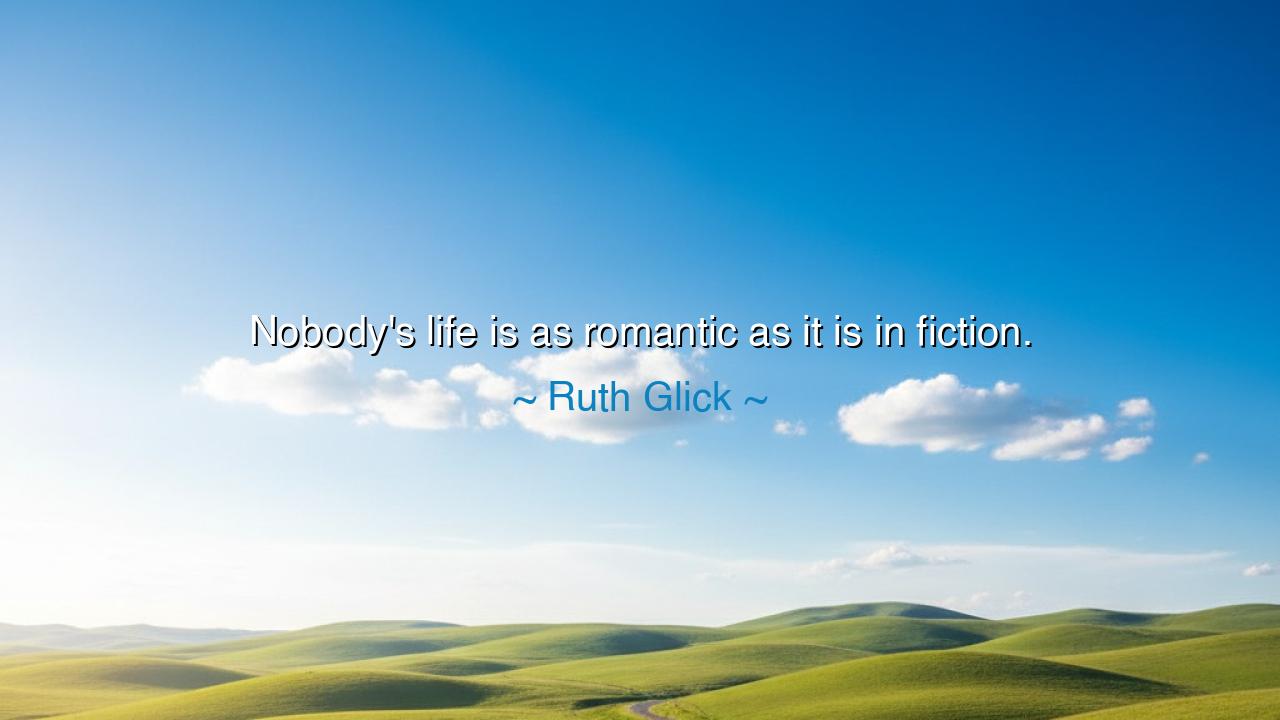
Nobody's life is as romantic as it is in fiction.






"Nobody's life is as romantic as it is in fiction." These words, spoken by Ruth Glick, strike at the very heart of the illusion we often harbor about life and love. They remind us that while the world of fiction—whether it be in novels, movies, or poetry—offers a view of romance that is often idealized, the reality of our lives is not shaped by the grand gestures and perfect moments that fill the pages of romantic tales. The romantic narrative that fiction presents can feel powerful and captivating, but it is not the full picture of what it means to live, to love, and to experience the world as it truly is.
In the ancient world, the tales of gods and heroes were often larger-than-life, with love affairs that defied logic, and relationships that transcended the ordinary. Achilles and Patroclus, for example, in the Iliad, share a love so profound that it seems destined to defy the very laws of mortality. But while these tales inspire us, they also remind us of the dangers of placing fictional ideals on real relationships. The romanticized vision of love that these stories present often blinds us to the complexities and challenges that come with actual human connection. Just as Achilles' fate is sealed by the demands of war and the tragic end of his love, so too do real-life relationships face the burdens and struggles that no epic poem can truly capture.
The romantic life we read about in stories is often detached from the gritty, mundane realities of existence. Think of Cleopatra, the great queen of Egypt, whose love affair with Julius Caesar and later Mark Antony has been immortalized as one of the most passionate in history. While the fictional portrayals of their romance are full of drama and intensity, the reality of Cleopatra's life was shaped by political intrigue, survival, and the weight of leadership. She was not merely the object of affection in a romantic epic; she was a powerful ruler whose decisions impacted the course of history. In her life, as in all lives, love was intertwined with duty, sacrifice, and the harsh demands of power—elements often left out of the romanticized versions of her story.
Glick’s words suggest that romance in fiction often exists as an ideal—a perfect union of hearts, where every obstacle can be overcome with passion, and every kiss is the culmination of an unspoken, perfect understanding. But the truth is far messier. Real life is not scripted with the convenience of perfect timing, the absence of conflict, or the certainty that everything will work out. Life’s romantic arcs are not always clear, and its most beautiful moments are often coupled with struggle and compromise. True romantic love is forged through time, through shared moments of vulnerability, imperfection, and growth—qualities that are often left out of the fictional stories that make love seem effortless.
Let us look to the life of Elizabeth Barrett Browning, a poet whose love for fellow poet Robert Browning is one of history's great romantic stories. Their relationship was full of passion and intensity, but it was also shaped by physical separation, the constraints of society, and personal suffering. Elizabeth was physically ill for much of her life, and their relationship was not without struggles, sacrifices, and the pain of separation. Yet, in their letters and poems, they captured a love that was not just romantic but grounded in real human emotion—the strength of their love emerged through hardship, not through the idealized perfection that so often fills the pages of fiction. Their story is a powerful reminder that the beauty of love comes not from perfection but from the willingness to love through the challenges life throws at us.
Glick’s reflection is a call to recognize the value in our own imperfect lives and relationships. It is a reminder that we should not expect our love stories to mirror the grand romantic ideals of fiction. Love in real life is full of ups and downs, with moments of joy intertwined with moments of sacrifice, confusion, and even heartbreak. True romance is not about perfect matches or flawless connections, but about the depth of commitment, the willingness to face challenges together, and the ability to grow together through life's inevitable difficulties.
The lesson here, then, is simple but profound: do not measure your love by the standards set in fiction. Real romance is found not in the drama of perfectly timed moments, but in the everyday acts of kindness, patience, and resilience. Love is not about seeking a fairy-tale ending, but about embracing the imperfections that come with truly sharing your life with another. Let fiction inspire you, but do not let it set impossible expectations. In the imperfection of real love lies its greatest beauty.






AAdministratorAdministrator
Welcome, honored guests. Please leave a comment, we will respond soon